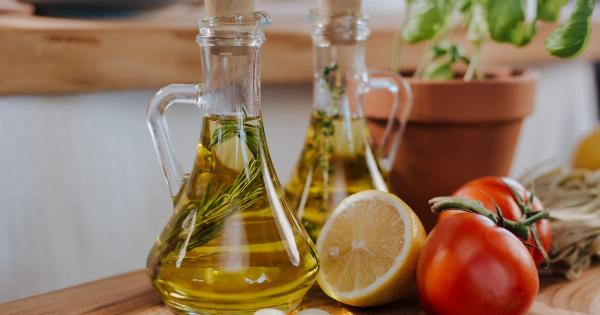Olive oil, with its rich history and numerous health benefits, has been an integral part of Mediterranean culture for thousands of years.
Revered for its tantalizing taste and various uses, olive oil has become an essential ingredient in cuisines all around the world. But have you ever wondered about the mysterious ways of olive oil? In this article, we will explore the origins, production methods, health benefits, and culinary uses of this ancient elixir.
1. The Origins of Olive Oil
Olive oil has a long and fascinating history that dates back to ancient times. The olive tree, scientifically known as Olea europaea, is believed to have originated in the region around the Mediterranean Sea over 6,000 years ago.
The first evidence of olive oil production can be traced back to the Bronze Age, with the ancient Egyptians, Greeks, and Romans all utilizing this precious liquid for various purposes.
2. The Production Process
The production of olive oil involves several important steps. Firstly, the olives are harvested from the trees either by hand or with the help of mechanical harvesters.
Once harvested, the olives are carefully sorted to remove any damaged or spoiled fruits. Next, they are washed to remove excess dirt and debris. The olives are then crushed or pressed to extract the oil from the fruit. This process can be done using traditional stone mills, hydraulic presses, or modern centrifuges.
3. The Health Benefits
Olive oil is not only renowned for its flavor but also for its numerous health benefits. It is a rich source of monounsaturated fats, which are considered heart-healthy fats.
These fats help to reduce bad cholesterol levels, lower the risk of heart disease, and improve overall cardiovascular health. Olive oil also contains powerful antioxidants that have been linked to a reduced risk of chronic diseases, such as cancer and Alzheimer’s disease.
Additionally, its anti-inflammatory properties can help alleviate symptoms of arthritis and other inflammatory conditions.
4. Culinary Uses
Olive oil is an incredibly versatile ingredient and can be used in various culinary applications. It is a staple in Mediterranean cuisine, where it is used for cooking, dressing salads, marinating meats, and even dipping bread.
Extra virgin olive oil, in particular, is highly valued for its superior taste and quality. Its fruity, peppery, and sometimes grassy flavors can enhance the flavors of dishes, making it a favorite among chefs and home cooks alike.
5. Different Types of Olive Oil
Olive oil comes in different varieties, each with its own unique characteristics and uses. Extra virgin olive oil is the highest quality and most flavorful type, as it is made from the first pressing of the olives without any heat or chemicals.
Virgin olive oil is also of high quality but may have slightly higher acidity levels. Light or refined olive oil, on the other hand, undergoes further processing and refining, resulting in a milder taste and higher smoke point, making it suitable for high-heat cooking methods.
6. Olive Oil in Skincare
Aside from its culinary uses, olive oil has also been valued for its benefits in skincare. Its moisturizing properties make it an effective natural moisturizer and can help nourish and hydrate the skin.
Olive oil can also be used as a makeup remover, an ingredient in homemade scrubs and masks, or even as a natural remedy for dry lips or cuticles. However, it is important to note that individual sensitivities can vary, so it’s always best to do a patch test before applying olive oil directly to the skin.
7. Olive Oil in Ancient Times
Olive oil played a significant role in the ancient world beyond its culinary uses. In ancient Greece, olive oil was considered sacred and was used extensively in religious ceremonies, as well as for lighting lamps.
It was also highly valued as a trade commodity and was even used as a form of currency in some regions. The ancient Romans used olive oil for cooking, skincare, and as a fuel source for lamps.
8. Storing and Preserving Olive Oil
Proper storage is essential for preserving the flavor and quality of olive oil. Exposure to light, heat, and air can cause the oil to oxidize and deteriorate over time.
It is recommended to store olive oil in a cool, dark place, away from direct sunlight and sources of heat. Additionally, using airtight containers and keeping the oil away from strong odors can help maintain its freshness and flavor.
9. A Growing Industry
The production and consumption of olive oil have increased significantly in recent years.
Mediterranean countries, such as Spain, Italy, and Greece, remain the largest producers of olive oil, but other countries, including the United States, Australia, and Argentina, are also making their mark in the industry. As more people become aware of the health benefits and culinary uses of olive oil, its popularity continues to grow around the world.
10. Conclusion: Embrace the Magic of Olive Oil
Olive oil has come a long way from its ancient roots, evolving into a global sensation loved by many. Its rich history, production methods, numerous health benefits, and culinary uses make it a truly remarkable ingredient.
So, the next time you use olive oil in your cooking or skincare routine, take a moment to appreciate the mysterious ways of this ancient elixir and embrace its magic.































